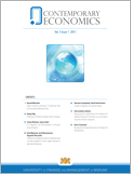Asymmetric Impacts of Macroeconomy on Environment Degradation in Thailand: A NARDL Approach
Asymmetric Impacts of Macroeconomy on Environment Degradation in Thailand: A NARDL Approach
Author(s): Nartraphee Tancho, Thanaporn Sriyakul, Changjiang TangSubject(s): Energy and Environmental Studies, Environmental and Energy policy, International relations/trade, Economic development, Accounting - Business Administration
Published by: VIZJA University
Keywords: Macroeconomy; economic growth; FDI; environmental degradation; NARDL;
Summary/Abstract: The study aims to examine the asymmetric impacts of macroeconomic variables on environment degradation. For this purpose, the study utilizes the data of Thailand over the period of 1990-2018. Data are gathered from Global Economy. Augmented Dickey Fuller (ADF) test is used to check the data stationarity. Results of NARDL reveal non-linear impact of macroeconomic variables on environmental degradation. Results show that positive and negative shocks in macroeconomic variables have different contributions in environment degradation. It is concluded that there exists non-linear/asymmetric relationship among macroeconomic variables (foreign direct investment, trade openness, industrialization, economic growth, globalization) and environment degradation as one-unit change (increase/decrease) in macroeconomic variable(s) do not bring the same change in environment degradation.
Journal: Contemporary Economics
- Issue Year: 14/2020
- Issue No: 4
- Page Range: 582-591
- Page Count: 10
- Language: English

